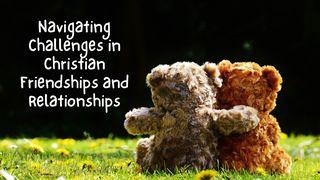The Weary World Rejoices: Daily Devotions for AdventSample

WHERE PEACE IS FOUND
By Matt Smethurst, Editor at The Gospel Coalition
REFLECT
Peace, as an idea, is immensely popular. We love talking about it, posting about it, dreaming about it, planning for it.
But it sure can be elusive, can’t it?
Despite its universally beloved status, peace does not mark our world—and I don’t simply mean unsettling head lines from distant lands. Peace eludes those in the securest neighborhoods, the richest professions, the most advanced nations. Peace eludes us even when we’ve arrived.
In his 2009 NBA Hall of Fame speech, Michael Jordan called the game of basketball his “refuge,” the “place where I’ve gone when I needed to find comfort and peace.” A few years later, on the occasion of his 50th birthday, the restlessness remained. In a candid interview with ESPN’s Wright Thompson, Jordan pondered aloud: “How can I enjoy the next 20 years without so much of this consuming me? How can I find peace away from the game of basketball?”
The answer, it turns out—both for Jordan and for us—is found in an ancient scroll.
Seven centuries before the Messiah’s birth, Isaiah the prophet issued a divine forecast. Addressing the Israelites, who were about to be exiled for their rebellion and idolatry, he pointed them to a future time when a solution—an undeserved remedy—would descend from God himself. He even hinted that the remedy wouldbeGod himself. This coming gift is cosmic in proportion and yet also in tensely personal. Notice the recipient: “to us” (v. 6). Israel’s name is on the label. And the contents are divine: the promised child will be none less than the “Mighty God.” Moreover, it’s a gift tied to the very thing that eludes us. The promised child will also be called the “Prince of Peace”—a fitting title because, for his people, there will be no end to “the increase of his government and of peace.” No exceptions, no elusiveness, no expiration date.
And the reason this promise will hold is because the gospel is bigger than a nativity scene. The incarnation of Jesus Christ was an invasion, both a dawning of peace and a declaration of war. The baby in the manger didn’t stay there, after all—he grew up and obeyed his Father to the point of death, even death on a cross. Suspended on Roman wood, he made peace between God and man (Eph. 2:14–17).
No other religion teaches anything like this. Each one insists, in some form or another, thatyoumust achieve the peace of God, some semblance of transcendental tranquility—which is also why it never happens. How could it? As a sinner you are the problem in this equation, not the solution. In Christianity, however, you can:
receive the peace of God, through trusting Jesus;
enjoy the peace of God, through following Jesus;
spread the peace of God, through proclaiming Jesus.
Friend, if you want to experience the peace of God, you must know the God of peace. And if you want to know the God of peace, you must embrace his only begotten Son.
Real peace is not found in a basketball arena or a Hall of Fame ceremony. It’s not found in a successful job or a secure neighborhood. It’s not found in food or exercise or travel or holiday cheer.
It’s not even found in a loving family or a vibrant ministry. In the final analysis, peace is only found in the Prince of it.
RESPOND
In what created thing has your heart been seeking peace? How might the gospel of grace liberate you from that exhausting pursuit—reordering your loves and redirecting your allegiance to the Prince of Peace?
REJOICE
Hail the heaven-born Prince of Peace!
Hail the Sun of righteousness!
Light and life to all he brings,
Risen with healing in his wings.
–Charles Wesley, “Hark! The Herald Angels Sing”
Scripture
About this Plan

For generations, churches and families have used Advent wreaths to help prepare for celebrating the Lord's birth at Christmas. The evergreen wreath symbolizes eternal life and includes four candles—typically three purple and one pink, with a white candle in the middle that symbolizes the purity of Christ. Various traditions assign different topics to each candle, and the candles are usually given names to remind us of the good news of Christ's birth.
More
Related plans

Preparing for Christmas

Why Did Jesus Come to Earth?

Good News

Live Life Today!
![[Deeply Rooted] Stand Strong](/_next/image?url=https%3A%2F%2Fimageproxy.youversionapistaging.com%2Fhttps%3A%2F%2Fs3.amazonaws.com%2Fyvplans-staging%2F52679%2F320x180.jpg&w=640&q=75)
[Deeply Rooted] Stand Strong

Stories of Strength Through Pain in the Bible

Navigating Challenges in Christian Friendships and Relationships

Debt-Breaking Prayers: Your 3-Day Battle Plan for Debt Freedom

Moving Toward Each Other in the Middle of a Divisive World
